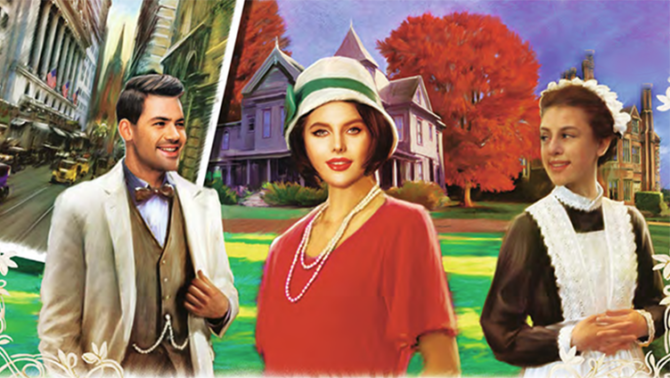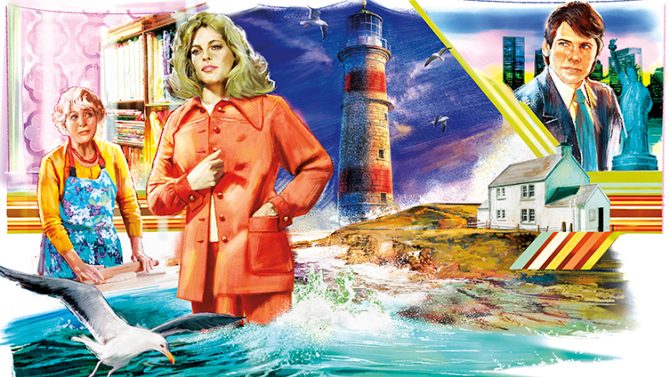Remembrance Day Story: For Idle Hands
To honour Remembrance Day, we're sharing Alison Carter's story, For Idle Hands. First published in The People's Friend November 10, 2021.

Shutterstock.
Subscribe to The People’s Friend! Click here
To honour Remembrance Day, we're sharing Alison Carter's story, For Idle Hands. First published in The People's Friend November 10, 2021.

Shutterstock.
To honour Remembrance Day, we’re sharing Alison Carter’s story, For Idle Hands. First published in The People’s Friend November 10, 2021.
Set in 1921
Keeping busy seemed the best way to cope in the aftermath of war . . .
THERE was always money, Minnie thought, but it was always somebody else’s money.
London was the worst for it – the gaping hole between rich and poor.
Today, for instance, seated around the middle table of her tea shop, was a collection of toffs, talking nineteen to the dozen and ignoring their drinks.
“More hot water?” Minnie asked, hovering behind one of the two gentlemen.
He was a military type, with a straight back and moustache. The lady of the three, probably his wife, looked up and smiled.
“We’re quite all right, thank you,” she replied.
There was an accent, but Minnie couldn’t pin it down. She didn’t hold with foreigners.
The French were all right, and had helped win the war, though when they came in she never could understand a word.
“It’s all in the back of their throats,” she told her sister.
“What is?” Ellen asked, tipping raisins in for the rock cakes, distracted.
“Their language. It’s like they’re about to swallow all the words.”
“Oh.” Ellen often went off into a world of her own.
Her husband had died in Belgium in 1918, and he lay there now in Flanders Fields, three years later.
Sometimes Ellen seemed to be there with him, when she went into herself. But she worked very hard.
It was as though work kept her mind from unravelling.
With his forearm, the military gentleman moved aside a plate so that it was almost falling off the table, and leaned forward to talk.
Minnie longed to step in and move the plate to safety, but these people looked important. They had an air about them and, goodness, they talked!
Minnie’s family had lived on the Old Kent Road for generations, always feeding people for a living.
Nowadays it was the tea shop, run by Minnie and her sister day in, day out.
Before that it had been a fleet of bakery carts, and before that, meat supply to the city.
“The Oxleys have been in the food business back to the days when this was a country lane to Kent,” Minnie would say to her customers.
She’d bend at the knees, her corset giving a little creak, to look out of the shop window and wave a hand east to west.
“Drovers would come up and down here in mediaeval times, bringing sheep to London – my ancestor among them.
“He settled here once he was done driving sheep, and here we are still.”
The Great War had changed things in the Old Kent Road.
The whole country was suffering from the after-effects: there were too many widows, wages were low and work scarce.
But there were still wealthy customers ordering tea and cakes and not consuming them.
“Major Howson; Mrs Howson,” the other gentleman said, “I say we go ahead.”
Minnie smiled to herself. She had correctly identified the military man, and now wished she had made a stab at his rank, too.
Ellen would be impressed. She might even laugh.
Ellen was not lively these days. She pointed out injured men in the London streets, and often mentioned Ernest’s comrades, who had no job because they had lost a limb or an eye.
“At least my Ernest is not here to feel he’s wasted,” Ellen would say.
She was upset that they had been (as she saw it) forgotten.
“Leonard Button was so good with his hands,” she would complain, “and now he feels he has no use.”
The lady at the table, Mrs Howson, was talking again. Minnie wondered if she was South African, or possibly Australian.
“I am so pleased you are urging my husband on, Mr Cohen. He can be cautious, and in this endeavour we should be bold.” She smiled.
“After all, we don’t the lack funds, George and I, for the purchase.”
“I would very much like to see all those department stores across New South Wales,” Mr Cohen added. “Your father built quite an empire.”
“He did, and Jessie inherited,” the major said, “and now she is fond of spending it all on new enterprises!”
Minnie snapped the sugar canister shut.
Money. She had spotted that, just like she had spotted the soldier.
She returned to the counter and listened to them talk about the lady’s family business in Australia.
The major smiled fondly at his wife. Clearly he had benefited from her money.
Department stores made a bob or two.
“Yes, Cohen, we should buy the land and build,” Major Howson declared. “I can make Parliament aware from the benches, and lend support.”
They all sat back. Something big had just been decided and they were going to do well out of it.
Minnie took another look at the second man, Cohen. It wasn’t so easy to spot an MP; they came in all shapes and sizes and were an untrustworthy lot who never noticed real people.
The Old Kent Road had hundreds of houses along it, and hundreds of businesses – so much struggle and so much loss.
Whatever these people were about to build, Minnie doubted it would improve matters.
She looked out of the window at the turning into St James’s Street.
They might be planning to pull down the old collar factory. It was within sight of the tea shop, and they might have chosen to have their discussion here because of that proximity.
The collar factory had been closed for ever so long. It was a shame it was defunct, and Minnie wondered why, as people still wore collars. But plenty of manufacturing was defunct.
“We can employ only a few chaps to begin with,” Mrs Howson said, and Minnie imagined some sort of elegant establishment – a gentleman’s club, perhaps.
Ellen came in from the back and Minnie nodded towards the group.
“Property buyers,” she said, “with cash to burn.
“What is the Old Kent Road coming to? Pilgrims passed along here on their way to Canterbury centuries ago – the ones Chaucer wrote about.”
“I know, Minnie,” Ellen replied. “Do we need milk?”
Minnie took the group their bill – a nice big one – and they left.
Minnie slid the money into the till and thought about a little holiday for her sister.
Ellen was nine years her junior and should be enjoying life, not moping.
Perhaps there was enough for a day out at Broadstairs.
Minnie forgot the three customers until August, when she and Ellen passed the collar factory and saw a trestle standing in the summer sunshine, just outside the gates.
The factory had clearly changed hands: there was a new slat fence around most of the perimeter, and the wall sign announcing the manufacturer of collars stood on its end, sticking up towards the sky.
“That’s the lady who didn’t drink her tea!” Minnie cried.
“It’s who?” Ellen asked.
“Her name was . . .” Minnie thought hard. “Jessie.”
“What’s she doing?” Ellen asked.
They stopped near the gates and Minnie saw the major and the MP gentleman appear from around the corner.
“Good heavens, Howson, we need to get inside,” Mr Cohen said.
“The lawyer hasn’t handed over the keys,” Mr Howson replied. “But my wife is not put off by a little thing like our not owning the bricks and mortar yet.”
“Naturally,” Mrs Howson replied with a laugh.
On the table was a wooden tray, and on the tray were a dozen or so paper flowers.
“I got them straight from Madame Guérin herself,” Jessie Howson declared.
“I want to stick them up somewhere to make a splash. I have a bill to post.”
“It’s a poppy!” Ellen cried.
The traffic in the Old Kent Road had fallen silent for a moment and her words carried.
Mrs Howson looked up.
“It is,” she said. “Good afternoon.”
She paused, gauging the look on Ellen’s face.
“They mean something,” she said, “poppies.”
“I know they grow . . . there.” Ellen nodded.
Minnie watched the bad memories flit across her sister’s face, the sadness that had barely faded over nearly three years.
Minnie had read about poppies for remembrance.
On the rare occasions when there was half an hour of quiet in the tea shop and somebody had left a newspaper, she had learned that Americans had been wearing poppies as buttonholes, and the French had followed suit.
“These are paper,” Mrs Howson explained, and she picked one up, twirling it by its tiny stem. “But the colour is true, I think.
“They were brought here by a French lady, Madame Guérin, who employs war widows to make them for French people.”
Mr Cohen nodded.
“We are to have our own day for remembrance come November,” he said. “You may have heard.”
“Armistice,” Ellen said quietly.
“Exactly.” Mr Howson nodded. “The eleventh. Madame Guérin sent these examples over and Field Marshall Haig thought the idea a splendid one. Madame is sending millions more, so that we can –”
“Millions?” Ellen’s voice was only just audible.
Mrs Howson came out quickly from behind the trestle. Minnie could see the understanding in her eyes; she knew that in Ellen’s heart was someone she had loved and lost.
“Yes, millions, because millions want to honour our fallen. The poppy has been a symbol of the battlefield for longer than we think.
“There are letters from the Napoleonic Wars that tell us how the poppy thrives in disturbed ground – war ground – where other flowers give up.”
“Jessie.” Her husband stepped forward. “I think you might be upsetting this lady.”
“Of course, dear,” Mrs Howson said. “I’m sorry.”
She looked at Minnie.
“I remember we took tea in your excellent establishment, and I believe I did not finish my Chelsea bun.”
She held out a hand and Ellen and Minnie shook it, blinking in the sunlight and with the surprise of the encounter.
“My husband, Major Howson, and Mr Cohen MP founded a charity only last year. The Disabled Society.” Mrs Howson looked up at the building.
“We have bought this place and we mean to make poppies.” Ellen held out her hand and Mrs Howson knew immediately what the movement meant.
She placed the flower between Ellen’s fingers.
“We hope to employ ex-servicemen,” Mr Howson explained.
“I’m ashamed to say it will be only five or six to begin with, but we are confident that before long that will become –”
“Millions,” Ellen interrupted. “Of poppies.”
She brought the flower to her lips.
“There are men around here who’d enjoy the work.”
“We hope so.” Mr Cohen smiled.
“Work is what is needed,” Ellen added firmly. “Work saves me every day.”
Minnie’s hand went to her mouth. Her sister had never said anything like that before.
“Golly, I could do with a cup of tea,” Mrs Howson said briskly, saving anyone’s embarrassment. “George, bring the poppies, will you?”
“We’d be pleased to welcome you as our guests,” Minnie said.
She was looking up at the flat grey façade of the building.
“This is another interesting piece of history for the Old Kent Road. Did you know that Charles the Second crossed this very spot when he came back to London to be crowned after Cromwell was –”
“Minnie,” Ellen interrupted. “Let’s go and put the urn on.”
Her voice was different. It had something in it: a hint of purpose, a tiny thing like a soap bubble rising.
“Righto.” Minnie smiled.
Read some Remembrance Day poems from the “Friend”.

Katie Ashmore

Paula Williams

Deborah Siepmann


Alison Carter


Teresa Ashby

Beth Watson

Alyson Hilbourne

Katie Ashmore

Kate Hogan

Liz Filleul